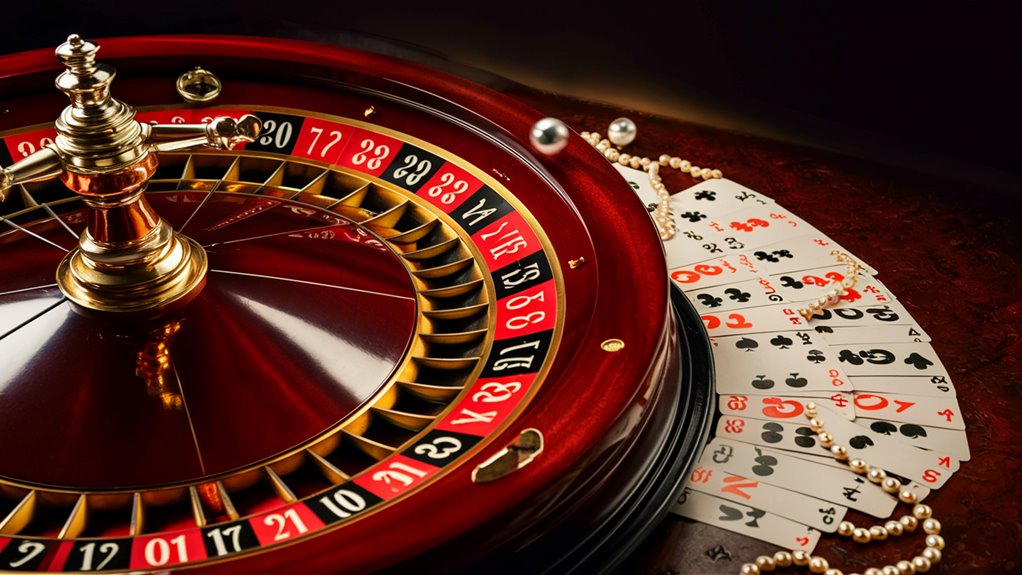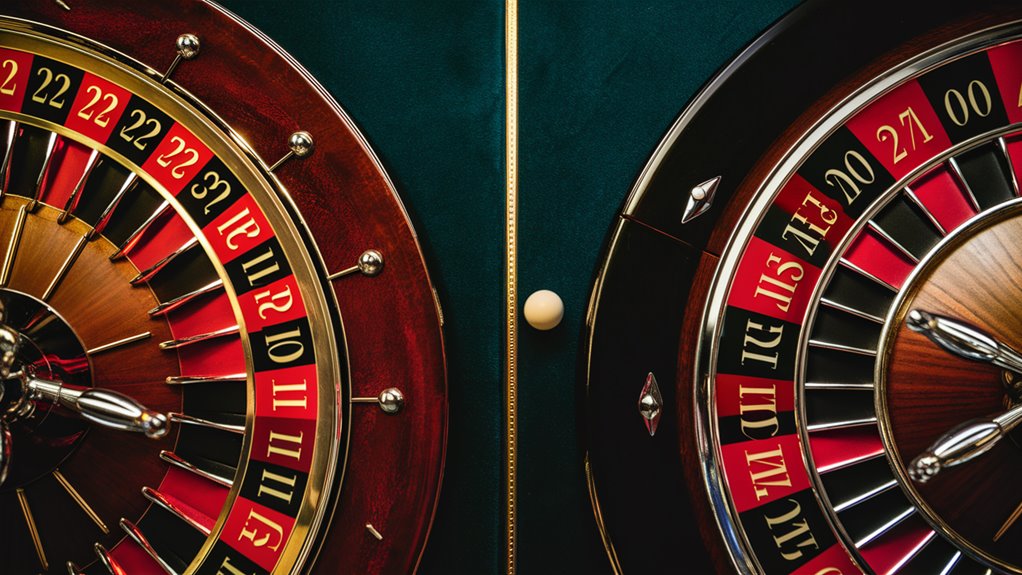Roulette Myths: Key Facts You Need to Know

Random Number Generation Explained
Roulette spins are truly random, with each turn not linked to the ones that came before. Modern-day casinos use complex Random Number Generators (RNG) that get checked and certified often to make sure there is true fairness and random play. 더 많은 정보 보기
Clearing Up Common Myths
Many think that hot and cold numbers affect roulette outcomes, but this is false. Also, good luck charms and betting plans like the Martingale system do not change the built house edge – 2.7% for European roulette and 5.26% for American roulette.
How Roulette Truly Works
Roulette works based on math chances alone. No betting method can change the fact that the casino always has an edge. Even though online platforms use trusted tech to keep the game fair, the basic math still rules how chances work out.
How the Game of Roulette Really Works
Expert gamblers and scholars know that roulette outcomes follow strict rules of chance. The wheel’s design and how numbers are spread ensure total randomness, so past or future spins can’t be predicted or changed based on what has happened before.
Casinos and Chance
The casino’s edge is set, no matter how you bet or how long you play. Roulette is a game of luck, not skill, due to these unchanging odds.
Understanding Hot and Cold Numbers
Analyzing Hot and Cold Numbers in Roulette: A Data-Driven Look
Why Number Frequency Doesn’t Help
Hot and cold numbers are one of roulette’s most misunderstood ideas. This deep look shows why watching numbers that show up a lot or rarely doesn’t help you play better.
Each Spin is Its Own Event
Every spin in roulette is its own event, driven by its own set of math rules. What happened before does not matter. Each number’s chance:
- European Roulette: 1/37 chance per number
- American Roulette: 1/38 chance per number
Breaking Down Common Misunderstandings
The Gambler’s Mistake
Thinking you can guess numbers is the gambler’s mistake. Players wrongly believe that:
- Hot numbers will keep winning
- Cold numbers must show up soon
- Past games tell you what comes next
It’s All About the Math
The house edge is fixed no matter how you bet:
- European Roulette: 2.7% house edge
- American Roulette: 5.26% house edge
No amount of tracking or analysis changes these hard math truths.
How to Play Roulette Smart
Smart roulette play means knowing:
- Real random patterns
- How odds work
- How to manage risks
- How much money you have
The only smart way to think is to see each spin as new, without ties to past spins.
The Martingale System is Flawed
The Real Deal on the Martingale Betting Plan: A Close Look
Why the Martingale System Falls Short
The Martingale betting plan can’t beat the roulette house edge. This deep dive shows why this popular method ends up in losses. Splitting the House Edge
Limits and Money Concerns
Casino bet limits stop the Martingale plan’s key idea from working. These limits keep you from doubling bets endlessly, which usually leads to big losses.
The Hard Math
Increasing bet sizes show the danger:
- Start with a $5 bet but need $640 after 7 losses
- A 10-loss run needs $5,120 in bets
- The rapid growth of needed bets quickly becomes too much
- House edge is always there on all spins
- Chance of a losing run is quite high
What Happens in the Long Run
The long-term impact of the house’s edge always shrinks your bankroll. Even with lots of money, the Martingale system puts players in risky spots for small possible wins. The math of the casino’s edge ensures no long-term profits with this betting style.
When Bets Go Wrong
Losses add up and force bigger bets:
- Each lost bet raises how much you need
- Getting money back needs more and more cash
- The risk and reward balance is way off
- Limits stop you from making it all back
The Martingale system’s design makes it fail as a trustworthy betting plan.
Past Spins Don’t Count
Knowing About Past Spins in Roulette: A Math Breakdown
How Roulette Stays Random
Every roulette spin is independent, set by math rules and physics. Past spins do not change what happens next, no matter what some might think.
Myths About Roulette Patterns
Finding patterns and marking numbers are big myths in roulette. People fall into traps, thinking some numbers must come up or the game must even out. This wrong idea comes from the gambler’s fallacy – a wrong way of seeing random acts. Snowglobe Poker: Shaking
The Sure Math of Spins
Odds Stay the Same
The sure truth is: a roulette wheel has the same odds all the time, no matter what has happened. If red shows ten times in a row, the next spin’s black chance is just the same. The wheel has no memory, keeping fair odds for each possible turn.
Why Patterns Don’t Help
Hot numbers, cold numbers, and other pattern betting can’t shift the core house edge. Every spin keeps the same odds, regardless of what happened before. This math fact makes pattern betting weak against the real random nature of how roulette works.
How This Shapes Betting
Knowing that spins are separate is key for smart roulette play. While you can watch spins and look for patterns, these things can’t beat the stats that run each new turn.
Do Lucky Numbers Help?
Lucky Numbers in Roulette: Seeing the Math

Lucky Numbers Don’t Change Odds
Each spot on a roulette wheel has the same odds every spin, no matter if it means something to you or what happened before. On a European roulette wheel, each number has a 1/37 (2.7%) win chance, and on an American one, it’s 1/38 (2.6%).
Stats Show the Real Picture
Deep number analysis on lots of spins shows no spot does better over time. The house edge is fixed:
- European Roulette: 2.7%
- American Roulette: 5.26%
The False Idea of Lucky Numbers
People link wins to:
- Birthday dates
- Anniversary dates
- Past win runs
- Personal lucky spots
Yet, math odds stay the same no matter these things. When players think they win from lucky numbers, they just remember the good times more than the bad.
The Constants in Roulette
Even if one number wins a lot, the next spin has the exact same odds:
- On a European wheel: 2.7% per number
- On an American wheel: 2.6% per number
These fixed numbers run each spin, so lucky numbers don’t work better than picking at random.
Is Online Roulette Fair?
Is Online Roulette Unfair? Truth About RNGs
Fair Online Roulette and RNG Tech
Proper online casinos use advanced random number generators (RNGs) checked often to keep the game fair. These systems copy the same odds as real roulette wheels, so games online are just like playing in a real place.
RNGs are Checked by Rules
Groups like the Malta Gaming Authority and UK Gambling Commission keep a close watch on online roulette.
- Casinos must be RNG certified
- They must submit to checks often
- They must show they are fair
- They must be open about how they run
How to Know if Online Roulette is Fair
Signs That an Online Roulette Game is Fair:
- Good licenses from known places
- Testing proofs from groups like eCOGRA
- Open RNG facts
- Audit reports for everyone to see
Signs of Unfair Games:
- No license info
- No tests from independent places
- Bad reviews from players
- Secret or unclear ways of running
Tech that Makes Play Fair
Today’s online roulette uses encryption RNG systems that make sure:
- Each spin is its own
- Outcomes can’t be guessed
- Odds check out as true
- Results come up right away
Good rules, the latest tech, and outside checks make sure online roulette games are as fair as any game in a real casino.
Can Betting Systems Beat the House?
Why Betting Systems Fail to Beat the House Edge
The Math behind Casino Betting Systems
Well-known betting methods like the Martingale system sound good but can’t beat gambling math. These betting methods do not change the base stats that make the house win.
Flaws in Common Betting Systems
The Martingale System
The Martingale betting method wants you to double your bet after each loss, assuming you have endless money and no bet limits. In real life, this system fails when:
- You reach the max bet limit
- You run out of money during bad runs
The D’Alembert System
The D’Alembert method raises the bet slower but has the same math problems. It can’t remove the house advantage on all gambling plays.
How Independent Events Work in Gambling
Casino game turns are standalone events, which means:
- Past results don’t change future spins
- Betting styles can’t change odds
- The house edge stays set:
- 2.7% on European roulette
- 5.26% on American roulette
While betting plans might give some short-term wins, the math rules make sure long-term losses come to those who lean on these methods.
European vs. American Wheels
European vs. American Roulette Wheels: A Serious Look
Main Differences in Design and House Edge
The two main roulette types show big differences that really change how the game goes. The European roulette wheel has 37 spots including a single zero (0), while the American roulette wheel adds an extra double zero (00) to make 38 spots.
The Math Edge
The math clearly favors European roulette:
- European wheel house edge: 2.7%
- American wheel house edge: 5.26%
This means real differences in expected losses. A $100 bet on European roulette normally leads to a $2.70 loss, while the same bet on American roulette costs $5.26, almost double the loss.
Odds and Payouts
Comparing Straight-Up Bets
- European wheel odds: 1 in 37
- American wheel odds: 1 in 38
- Usual payout
Even though payouts are the same, the odds difference makes a big downside for players on American wheels. The European roulette type gives the best odds for all bet styles, making it the best choice for keeping more of your money and helping your chances of winning.
Best Plan
People who want the best chance to win should look for and play on European roulette wheels, as they give truly better math odds and take less money in the long run when compared to American ones.